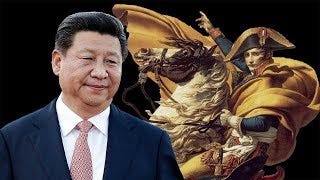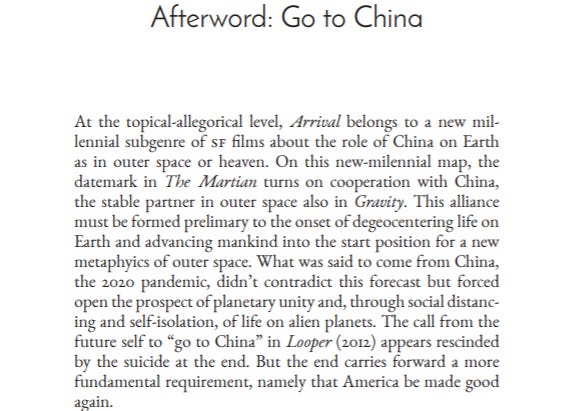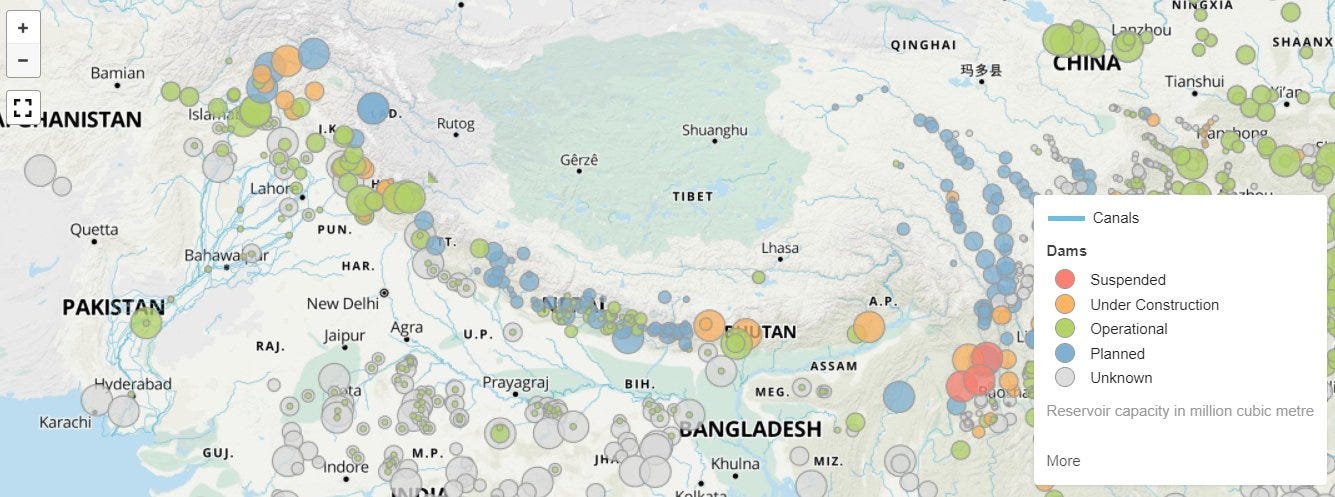The very existence of Tibet and its invisible ongoing physical and cultural genocide provides an internal limit to any fetishization of China, a fetishization that has now become something like a popular defence mechanism online:
An unconscious strategy may have existed whereby it was possible to co-opt a fondness for China in advance of (what was) Donald Trump’s possible defeat:
We operate under the same illusion now. Hyper-ironic Sinophilia masquerades as something other than omnilapsing exoticism. Stick with the winners is the unconscious driver readied for a century of actual Chinese collapse.
Here is Mohammad Salemy on 19 January 2021 on Facebook:
The future of socialism will not be determined by theorists and writers in the west but by actually existing socialist states like China. Thus when we position ourselves as pro-China, it is mainly because of this high probability. When we say we like China we mean we are interested and excited about the future of China, not its present state.
What does it mean to dismiss China’s ‘present state’ in the name of its future (almost certainly never arriving) secure technological state? Who is this ‘we’? Is it a dangerous or welcoming ‘we’? Is it not merely a cover for the inoperability of ‘socialisms’ (plural) in the West right now?
Or again:

How does this China fetish function, then? What secrets does it cover over?
If we assume it really is correct that the existence of Tibet provides an internal limit to any fetishization of China then we may also assume what the projected reaction to this is: that even now, even under present conditions, there is a promised second stage that follows the authoritarian uncanny valley of accelerative Chinese sovereignty projected onto us, that Tibet is to be sacrificed as ‘externality’ and, eventually, it will have been worth it.
Such is the auto-teleo-logical calumny that ‘actually existing socialism’ often protects and hides. Such is the inner logic of ‘actually existing socialist states like China’ as they flash on the dashboards of the West, since China does not just depend on Tibet as sacrificial externality but seems to have only been able to exist—if it does exist as true socialist quantum—by being predicated on that singular repression. But this already suggests that ‘Tibet’ is not an externality but an internal limit that impossibilises all ‘actually existing socialist states’, hence the suspicion that no such states can or may exist.
But the mythy jargon goes on: Authoritarian capitalism is not to be condemned too quickly, especially in the form of a newly venerated China—it is, perhaps, to be preferred. China should be allowed the process of capitalist accumulation which in Europe went from the 16th to the 18th century and so on, as should any other nation.
Worse or better still—the defence continues—if this means that the lingering special effects of democracy as we have understood them for some time are no longer of the order of the viable, or are even an impediment, then so be it. Let China be your future, in other words.
Note that Rickels designates such a ‘going to China’ as fantasy, however real, of which the fantasy itself will provide a critique—the ‘suicide’ at the exasperated end when the movie gets too real.
This critique of fantasy is where the very name, ‘Tibet’, comes into play, a limit, a spoiler—‘the Tibet problem’ as internality predicated of ‘actually existing socialism’—whose existence we here begin to fail to assume—rather than overcome in a progress-towards.
For Xi Dada the path of hyper-accumulation on which China is engaged must bypass the problem of splittism and externality, as Stalin failed to do. Stalin, in Xi’s eyes, was not patient enough. Stalin, despite millions dead, did not go far enough with the problem of religion and ‘minorities’. As Massimo Introvigne says:
Xi Jinping and the CCP leaders of his generation are obsessed by the fall of the Soviet Union and other Communist countries in Eastern Europe. For them, understanding what went wrong there is literally a question of life and death, as their problem is avoiding that the CCP shares the same fate of the Communist parties in Eastern Europe. Xi Jinping believes that reasons for the fall of Communism in Russia and its neighbouring countries include the criticism of Stalin and the free rein left to independent religion. For this reason, Xi continues to crack down on religion and refer to Stalin in his speeches and writings.
Xi wants to solve the problem of externality, then. The genocide—and I use this word advisedly, with evidence provided by the Tibetans themselves, for example Tsering Woeser’s four hundred pages of documentation in Forbidden Memory—in Tibet has to be determined as externality and not as internal condition—accident, not fate.
And Xi’s solution for this ‘externality’ is long-term, more long-term than Stalin’s solution. It means solving the minority (minzu) problem with elegant patience:
The official name under which cultural genocide is hidden in CCP language is ‘second-generation ethnic policies’ (第二代民族政策). This means that the measures allowing a limited protection to minzu languages and cultures were acceptable for the first generations, who needed time to adapt to the CCP-dominated system. But they should disappear for the second generations. For example, it was reasonable to grant exceptions to some minzu from the rules limiting the number of children, because they needed time to understand and adapt to the CCP system. But it is not reasonable to maintain these exceptions today, nor to help minzu children with extra points in the university entrance exams.
Under the radar of everything else that was going on at the close of 2020, Lobsang Sangay, the president of the Tibetan government in exile, known as the Central Tibetan Administration, visited the United States. In an article in the Washington Post, Sangay was reported to have said, ‘when it comes to human rights violations in China, Tibet was Patient Zero’.
Sangay’s point is blatant—that much of the technical coup tactics becoming familiar under various guises in the West in the last year were trial-ballooned in Tibet, beginning with the ‘Cultural Revolution’, and then continuing into the present.
Tibet was not the only place of such experimentation and incision, of course, since the United States has had dozens of its own sub-continental ‘laboratories’, including the CIA’s own involvement in Tibet in the fifties and sixties. But Tibet, the name ‘Tibet’, has a singular resonance as site and memory of the Buddhist and especially Dzogchen lineage that is sheltered in this (basically Marxian) thought of ‘externality’, while being exposed.
A patient zero needs a real Treasure House to be worth it, and that is the case with Tibet. As Sangay also said last year:
Hence, what we have been saying is that what happened with Tibet could happen to you. From Taiwan to Hong Kong to East Turkestan, with a million or so people detained, including a Canadian citizen, a Uyghur Canadian, Huseyin Celil, who has been detained in China, all this clearly shows that what happened in Tibet 60 years ago is happening all over the world. There are a lot of lessons you can learn from Tibet.
Faced with ongoing evidence of Tibetan ‘paper genocide’, and far worse, as also carefully documented in Woeser’s Tibet on Fire, there persist at least these two typical responses or blinds. One is the fetishization of China made popular given the current failure of Western external politics, as already briefly shown. And the other is the refusal to listen to Tibetan voices when it comes to their descriptions of their own plight. In an at times obscenely inaccurate article written in 2008, the year of the Beijing Olympics, Žižek commits to the following:
The Cultural Revolution which ravaged the Tibetan monasteries in the 1960s was not imported by the Chinese. Fewer than a hundred of the Red Guards came to Tibet with the revolution, and the young mobs burning the monasteries were almost exclusively Tibetan.
Anyone who takes the time to read through Woeser’s Forbidden Memory will know that this claim is tragically wrong and ridiculously thoughtless, and yet they will also know why. The job of the CCP is to produce propaganda and suppression such that even Žižek will end up being easily mistaken in his conclusions.
Here are some more speculative thoughts, to be continued another time:
To some extent—at a purely spiritual level—the Tibetan stance is already to accept defeat, that is to say, deracination and a government in exile (Lobsang is in India too). This appears to be the opposite of the Jewish people after the war—not a militarised nationalism. The Tibetans as spiritual statists do not need a state; they fulfil in some ways Mitchell Heisman’s dream of letting go of nation rights.
Kanye’s position on China (‘I love China’) is diametrically opposed to Bannon’s war stance. Kanye is, to that extent, precisely Tibetan. The Dzogchen master imprisoned by the Chinese for 18 years, when asked what he feared the most, answers, ‘to lose compassion for the Chinese’. Perhaps we can think of our own various captors in the same way.
Even 9/11 was originally schematized as a chemicals attack (a bit like Snakes on a Plane but with anthrax instead of serpents). All inner and outer attacks share the same ‘intelligence’ airspace. If Covid was a CIA attack on Trump routed like a pre-ontological rumour (acidic gossip) over decades through a Chinese front, it would never be tracked as such.
Fentanyl and Covid both theoretically originate in the same Wuhan location. With the shutdown the opiate supply into America through Mexico was severely limited, and buyers turned to the Golden Triangle and Russia instead. Fentanyl and Covid are ‘co-ordinates’ of whatever origin.
One can go so far as saying the anchor points of Covid will remain completely unknown. ‘Inside job’, ‘patsy’, ‘leak’, ‘dark winter’—the point is that intelligence works through laws of destinerrance that are now far beyond what happened with JFK and 9/11. Instead a code: Janus techno germ Gestell.
‘What happened to Tibet could happen to you and is happening now.’ (Sangay)
China & methane clathrates
rape of the South China Sea
increased militarization of the Tibetan Plateau
Covid as new tech ‘cultural revolution’
CCP fentanyl 9/11.Maybe to properly unfold it, you have to read The Handbook of 5G, where you get a leap moment between invisible war (5G, and Covid) and 7th Gen War, where ‘the human body becomes the limitation’. Tibet is more than a limitation. Gestell saves by making human decisions irrelevant, but risks all (Dzogchen as the most precious).
The successful application of Seventh Generation Warfare (7GW) is not only ‘indistinguishable from magic’ but from Covid magic; it would rely on the mask of accumulated ‘conspiracy theory’ dismissal logics that the West is good at (anti-racism), and therefore bite—if it does.
‘Tibetanization’ should now replace the long-hackneyed alternatives (capitalism, globalization, and so on). The US no longer goes in under CIA auspices, but an impossible Sino-global intelligence merger allows all places to become Tibet, all raided and raped by an invisible ‘red plague’ that has unlocatable point 0s. It is precisely the fate of such ‘plots’ that you will never know.
Tibetanization.—What happened to Tibet happens to you. Therefore, study Tibet and hesitate before going-to-China. The future belongs to water not oil wars. Tibet is the Third Pole, massive reserve. Dams create ‘run-away-with-the-river’ effects, ‘monsoon clouds bounce’. Mount Everest as white phantom melt-event.







